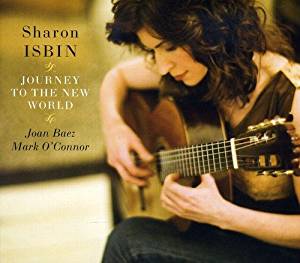 I am in the habit, when preparing to write about music, of putting a CD on the changer or carting it with me to work and letting it be part of my context for a day or two before I sit down to give it a close listen — a way of getting my ears accustomed to it, especially for an artist or idiom new to me.
I am in the habit, when preparing to write about music, of putting a CD on the changer or carting it with me to work and letting it be part of my context for a day or two before I sit down to give it a close listen — a way of getting my ears accustomed to it, especially for an artist or idiom new to me.
Sometimes the music won’t allow that: something will jump out of the soundscape and grab you.
The piece that jumped out of Sharon Isbin’s Journey to the New World was a deceptive little dance, “Andecy,” by Andrew York. It’s a hypnotic melody that could come from almost any place — perhaps Provence, or even Catalonia — and from a time not quite this one. It’s tremendously evocative and, to put it succinctly, quite beautiful. I was captivated and ultimately seduced, quite frankly. What was even more remarkable about it was the sound that Isbin pulled out of her guitar: rich, full, substantial sound graced with clear, delicate details that leaves behind the idea of “guitar” and takes us into the realm of pure music.
“Andecy” is, I think, emblematic of this entire collection, which is a strong one. It opens with a group of four Renaissance works for the lute, solidly grounded in the period (and including a very palatable version of “Greensleeves,” that lovely but sadly overworked tune). Those four provide a telling introduction to the album: the one nod toward anything that could be considered “classical,” they lay a solid foundation for a collection that is solidly in the traditional/folk/protest mode.
Isbin brings the same delicacy and strength (along with some virtuoso turns) to her renditions of the traditional and almost-traditional works included. “The Drunken Sailor” is marked by fluency, speed, and clarity, while “Wild Mountain Thyme” is a sweetly melancholy version with steel underneath, both of them, again, signposts for what we can expect from other selections.
Joan Baez’ influence seems to pervade this disc, not only in the focus of the material but in the “Joan Baez Suite,” a work by John Duarte that is almost a survey of Baez’ career. She herself makes two appearances here, performing “Wayfaring Stranger” and “Go ‘Way From My Window.” One’s first reaction is “This is not the Baez I remember!” That heartbreaking purity that was so much a part of her singing does not take center place, but what we get makes up for it: the fire has given way to introspection, the passion is transformed to poignancy, and there is a new kind of power supporting her. She is, as one might expect, quietly and subtly amazing.
The finish is an extended duet for Isbin and Mark O’Connor, playing O’Connor’s “Strings & Threads Suite,” which runs the gamut from traditional fiddling of a high order to some very nicely done ragtime and blues. If I have an objection to this one, it’s that Isbin could be more in evidence (although I’m certainly not going to argue against showcasing O’Connor — some fine violin work there).
If you’re expecting “classical” guitar, there are other releases by Isbin more in that vein. This one is an indirect and polished survey of where our “traditional” music came from and some of the places it has gone. Very nice.
(Sony Classical/Sony Music Entertainment, 2009)
